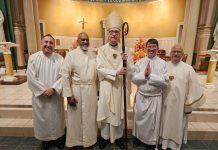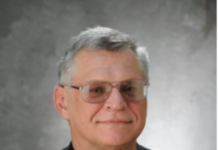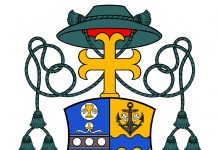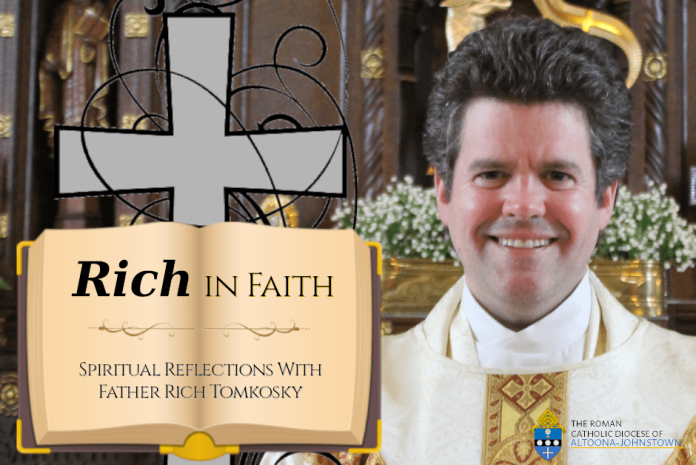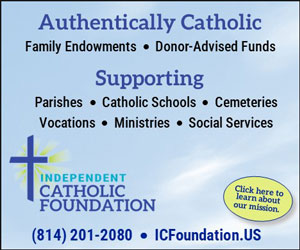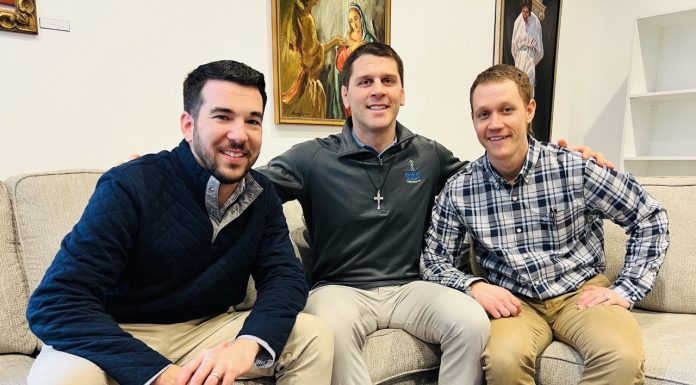By Father Rich Tomkosky
This is the ultimate question of our life as a human being. We are called to love and to be loved; that is the human vocation in God, but what does that mean? We are called to have a deep interior life of love with the Indwelling Trinity. From the moment of our Baptism, we are invited by God to “be holy as He is holy.” How we go about this will determine our eternal destiny! We need to remind ourselves of this on a frequent basis, so we stay on track spiritually. And especially in the divisive, often unloving, time in which we are living.
In the Vatican II document Gaudium et Spes or The Church in the Modern World (24) it states beautifully the nature of man’s vocation is to love, “the Lord Jesus, when praying to the Father, ‘that they be one…even as we are one’ (Jn 17:21-22), has opened up new horizons closed to human reason by implying that there is a certain parallel between the union existing among the Divine Persons and the union of the human sons and daughters of God in truth and love. It follows, then, that if man is the only creature on earth that God has wanted for its own sake, man can fully discover his true self only in a sincere giving of himself.”
The implication from this (see St. John Paul II Man and Woman He Created Them: A Theology of the Body (Pauline Press)) is the two fundamental principles of Christian love.
First, God wills human beings for their own sake, for their own good, from the moment of conception, which is why abortion is so evil. That child once conceived belongs to God, not us. Persons can never be used as mere means to some other end, our convenience, etc. They must be valued in themselves and NEVER be treated as objects. Pope St. JPII calls it the “personalistic norm” (see Love and Responsibility pp. 40-44). This is the foundation for all Catholic sexual ethics.
Second, human beings can only find themselves in a sincere gift of self. This is the basis for all the Church’s teaching on the meaning of divine and human love on a theological and practical level.
The saints are our models on how to love God and neighbor in a holy way, the way that is full of generosity and sincere gift of self. The Christian way of love is not the philosophy of love that says what’s in it for me, which is the fallen understanding of love, but rather it is what can I give to help the other and enter into the self-gift of the Triune Persons, the Trinity.
As Jesus says in Lk 17:33, “Whoever tries to preserve his life will lose it; whoever loses it will keep it;” which is the paradox of Christian love, to give is to receive. Is our life of love rooted in that Divine reality, be it our marriage, our friendships, and our general relations with our neighbors, co-workers and classmates, even people we don’t like? Do we really practice our Catholic faith in our daily life, living out the teachings of our Church whether convenient or inconvenient, loving the Mass and seeing the value of the Sacrament of Confession, and most of all spending time daily cultivating a deeper union with the Indwelling Trinity in prayer, out of a sense of love for God? Or are we simply fulfilling our “obligation” by coming to Mass and going to the Sacrament of Confession rarely, if ever, and maybe rushing through a few prayers each day with very little reflection or love behind them. Which way is pleasing to God?
Mere external observance, looking to others like a “good respectable religious person,” concerned what other humans think of us; or rather living the faith with integrity, concerned what God thinks of us? The solution to all human difficulties and problems on whatever level is a deeper union with the indwelling Trinity (see Fr. Thomas Dubay, Deep Prayer, Deep Conversion (Ignatius Press). How are we daily cultivating that reality with God?
The saints were people like you and me who decided at some point in their lives to put God first and entrust everything to His care. So, over time, the Holy Spirit was able to transform them ever more deeply into the image of Jesus who is the One who leads us into union with the Father.
The saints entered daily into the most exciting reality of all, which is to be drawn more intimately into the very life-giving eternal love of the Father, Son, and Holy Spirit in the depths of their human mind, heart, and free will in this earthly life, which led to a greater love for neighbor, seeing in people from conception to natural death the image of God whose children we all are and which we must help and defend. We always must be a people of life in a world that far too often chooses death. God bless you.
Father Rich Tomkosky is the Pastor of Saint Thomas the Apostle Parish in Bedford and the Pastor of Seven Dolors of the Blessed Virgin Mary Parish in Beans Cove.


